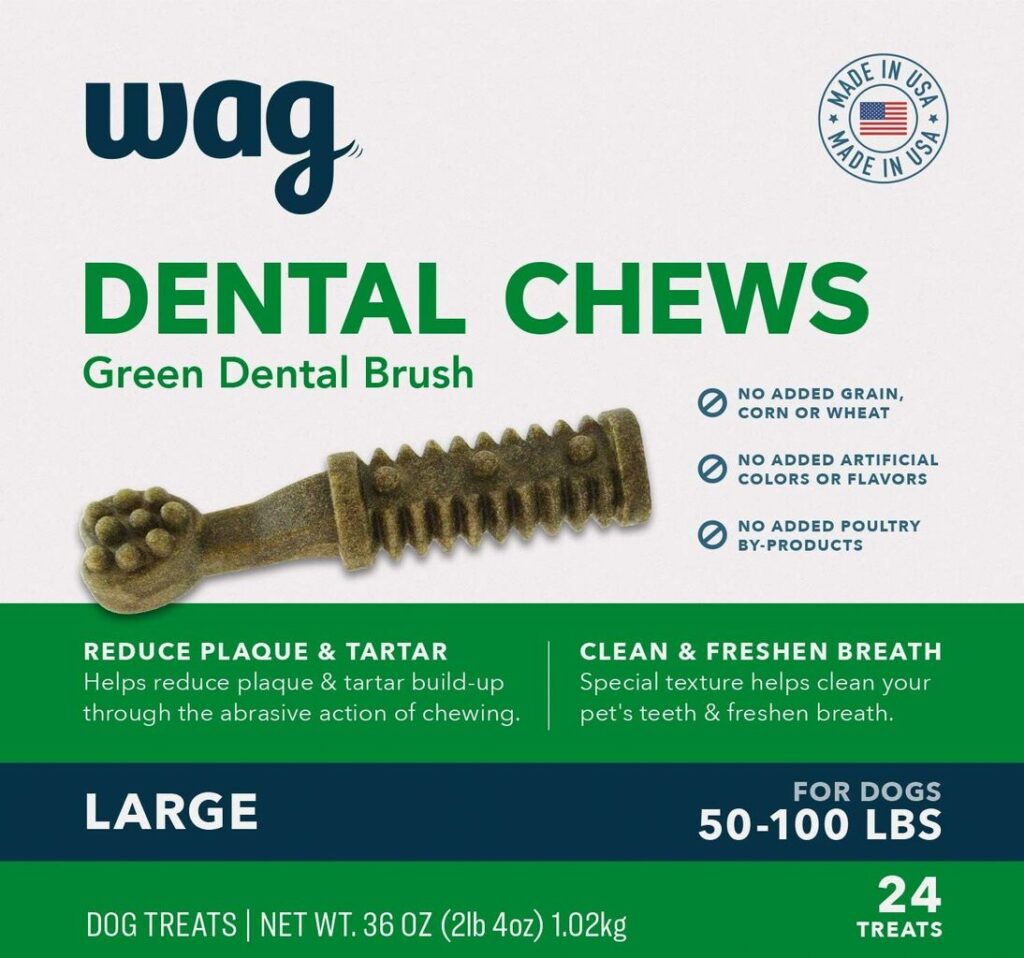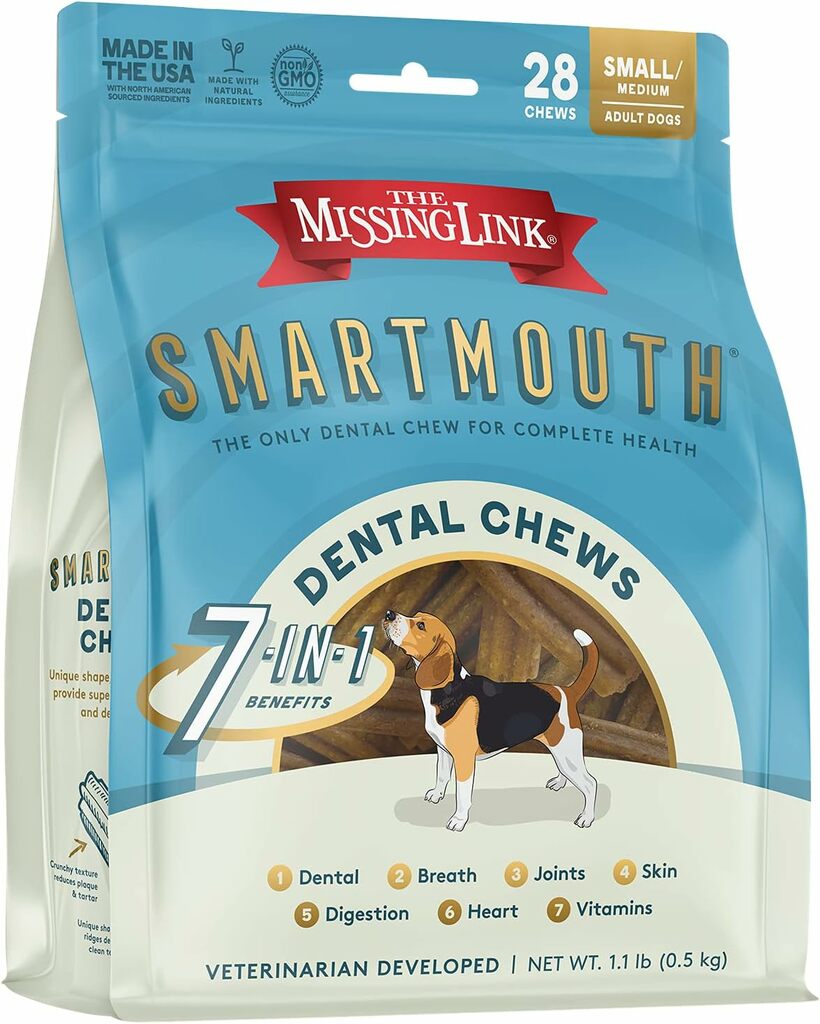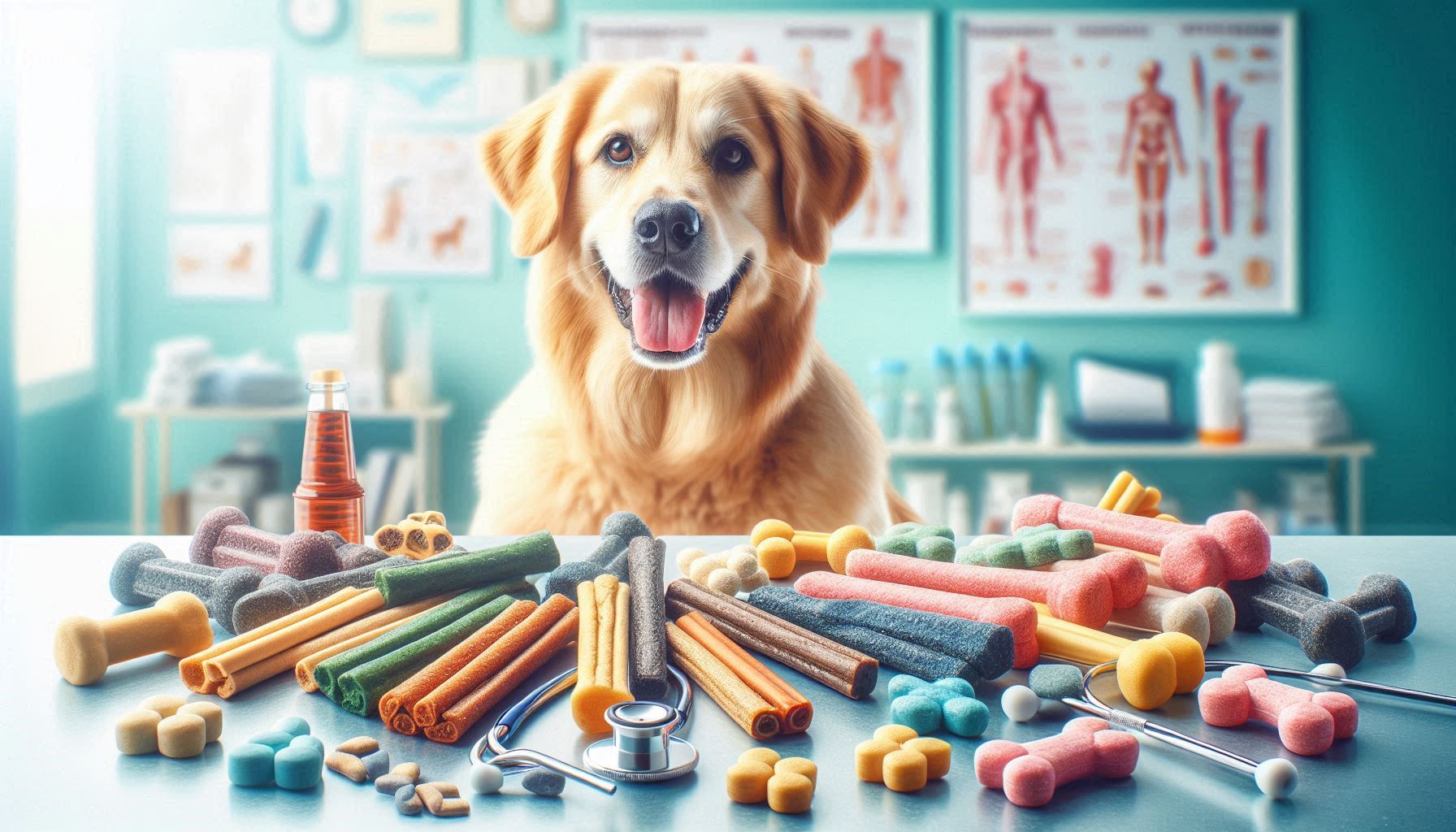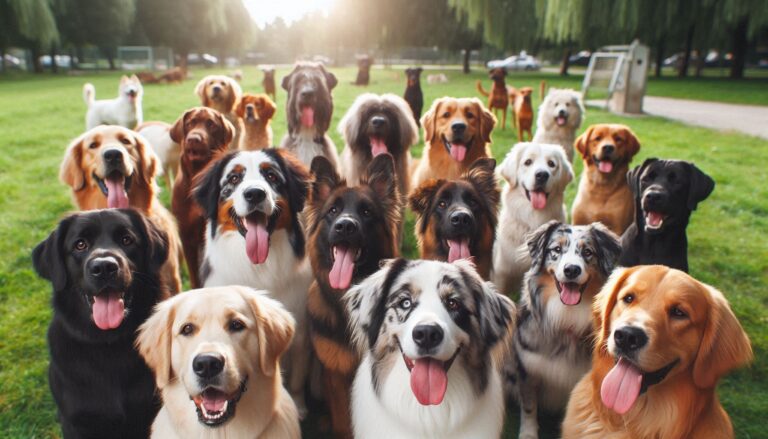
The Wag Dental Chews are a great product for keeping your dog’s teeth clean and healthy. The large size is perfect for bigger dogs and the unflavored option ensures that it won’t be overwhelming for your furry friend. With 24 chews in a pack, it’s a good value for the price.
The brush-like texture of these dental chews helps to remove plaque and tartar, promoting better oral hygiene for your dog.
Overall, I would highly recommend the Wag Dental Chews for dog owners who want to ensure their pet’s dental health. It’s an effective and affordable option in the market of dog treats and snacks.
- Green chews can help clean teeth
- Comes in different sizes based on dog’s weight
- Comes in four sizes to accommodate different dog breeds
- Comes in varying sizes to accommodate different dog sizes
- Helps keep teeth clean and breath fresh
- Quick consumption due to soft texture reduces effectiveness as a long-lasting treat
- Some dogs experienced gas, diarrhea, or vomiting.
Item Package: 2.3 Pounds
Size: 8 x 5 x 7.5 inches
Flavor: Unflavored
Brand: WAG
Items per Pack: 24
Daily dental routine: Yes

Nature Gnaws Bully Sticks for Large Dogs offer premium quality and satisfaction for both dogs and their owners. These natural beef dental bones are ideal for aggressive chewers, providing long-lasting enjoyment. The 12-inch size and thick texture ensure hours of chewing pleasure while promoting dental health. These bully sticks stand out for being rawhide-free, offering a safer and healthier option for pets. With a 5-count pack, there’s plenty to keep dogs happy for a while. They can even be cut in half if needed to make them last even longer. Overall, Nature Gnaws Bully Sticks are a reliable choice for canine companions.
- One ingredient only
- Chemical- and additive-free
- 100% natural, single-ingredient chew
- 100% natural beef
- Long Lasting
- Can still get stinky if touching things around the house
- Too hard for some dogs with sensitive teeth
Size: 12 x 9 x 3 inches
Weight: 6 Ounces
Type: Dog Chew Treats
Ingredients: Natural Beef
Quantity in pack: 5 Count
Usage suggestion: Always supervise your dog while they are chewing

The Missing Link Smartmouth Vet Developed Dental Chew Treats are a fantastic addition to any small or medium-sized dog’s diet. These treats offer a whopping 7-in-1 benefits package, making them an essential part of maintaining your pup’s overall health. Not only do they promote healthy teeth and gums, but they also freshen breath, improve skin and joint health, aid in digestion, support a healthy heart, and boost the immune system.
What sets these dental chews apart is that they were developed by veterinarians, ensuring that they are formulated with the best interests of your dog in mind. With 28 treats in each pack, your furry companion will have plenty to enjoy for weeks to come. Give your dog the gift of complete wellness with The Missing Link Smartmouth Vet Developed Dental Chew Treats.
- Made without corn, wheat, or soy
- Vet developed, recommended
- Vet-developed with 7-in-1 benefits
- Reported upset stomach in some Dogs
Type: Snacks
Weight: 1.1 Pounds
Amount of chews: 28
Package dimensions: 8.23 x 6.81 x 2.76 inch
For: Small/Medium 15-50lb Dogs
Daily usage: 1-2 chews per day
When should you start giving your dog dental chews?
Taking care of your dog’s oral health is just as important as taking care of your own. Many pet owners may not realize it, but dogs can develop dental issues if their teeth are not properly looked after. One effective way to maintain their dental hygiene is by giving them dental chews. But when is the right time to start?
While every dog is different, the general rule of thumb is to introduce dental chews as early as possible. Puppies as young as 6 months old can benefit from these chews as they start developing their adult teeth. By doing so, you’re establishing a healthy routine and preventing any future dental problems.
When choosing dental chews for your furry friend, it’s essential to opt for the best natural dog dental chews available. These chews are made from high-quality ingredients, reducing the risk of any harmful additives or chemicals. Look for products that are specifically designed to clean teeth, freshen breath, and promote healthy gums.
To ensure your dog gets the best possible dental care, consider exploring the top dog dental chews recommended by veterinarians and pet owners alike. Top-rated dog dental chews are known for their effectiveness in removing plaque and tartar buildup, preventing gum disease, and improving overall oral health. These chews are usually designed to be long-lasting, ensuring your dog gets extended chewing time for maximum oral care benefits.
Remember, regular dental check-ups for your dog are essential, even if you provide them with dental chews. Consult with your veterinarian to determine the best time to start incorporating dental chews into your dog’s routine based on their individual needs and breed. By starting early and using the best natural and top-rated dog dental chews, you’re setting your furry friend up for a lifetime of good oral health.
How often should you give your dog a dental chew?
Keeping your dog’s dental health in check is just as important as any other aspect of their overall well-being. One of the best ways to promote good oral hygiene for your furry friend is by providing them with healthy dog dental chews. These treats not only satisfy your dog’s natural urge to chew, but they also help prevent dental problems such as plaque and tartar buildup.
So, how often should you give your dog a dental chew? Well, it depends on a few factors. Firstly, you should take into consideration your dog’s age and breed. Puppies and younger dogs may have more active dental needs and may benefit from daily dental chews. On the other hand, older dogs may require fewer dental chews as their teeth and gums are already well-developed.
Another important factor to consider is the type of dental chew you’re using. There are various options available in the market, including dental sticks, bones, and treats. It’s essential to choose the best dental sticks for dogs or the best dog chews for dental health that are appropriate for your dog’s size, age, and dental condition. Reading the product label and consulting your veterinarian can help you make an informed decision.
Additionally, your dog’s individual dental health should be taken into account. If your furry friend already has a buildup of plaque or tartar, they may require more frequent dental chews to help clean their teeth. Regular dental check-ups with your vet can also provide valuable insights into the specific needs of your dog’s dental care routine.
In conclusion, providing your dog with dental chews is crucial for maintaining their oral health. The frequency of giving these chews depends on your dog’s age, breed, individual dental health, and the type of dental chew you choose. Keeping these factors in mind and consulting your vet will ensure that your furry friend has healthy teeth and gums, promoting a happy and active life.
Do dental chews really work?
Dental chews can be an effective part of your dog’s oral health routine when used correctly. Many dog owners and veterinarians report positive results from using dental chews regularly. These treats are designed to help reduce plaque and tartar buildup, freshen breath, and promote overall gum health.
The effectiveness of dental chews can vary depending on factors such as the quality of the product, how often they’re given, and your dog’s individual dental needs. While they can be beneficial, it’s important to note that dental chews should not be the only method of dental care for your dog. They work best when used in conjunction with regular tooth brushing and professional dental cleanings.
When choosing dental chews, look for products that have been approved by veterinary dental organizations. These chews have been tested and proven to be effective in reducing plaque and tartar. Remember, the best dental chews for dogs are those that are appropriate for your pet’s size and chewing habits.
How long does it take for dental chews to work?
The timeframe for seeing results from dental chews can vary depending on several factors. Some dog owners report noticeable improvements in their pet’s breath and visible reductions in plaque within a few weeks of consistent use. However, for more significant effects on tartar buildup and overall dental health, it may take several months of regular use.
It’s important to remember that dental chews are most effective when used as part of a comprehensive dental care routine. This includes regular tooth brushing and professional dental cleanings by a veterinarian. The best dental chews for dogs’ teeth are those used consistently over time, rather than sporadically.
To maximize the benefits of dental chews, it’s crucial to follow the recommended usage guidelines for the specific product you’re using. Some dental chews are designed for daily use, while others may be intended for less frequent consumption. Always consult with your veterinarian to determine the best dental care plan for your individual dog.
Can’t I just brush my dog’s teeth?
Brushing your dog’s teeth is indeed an excellent way to maintain their oral health and is often considered the gold standard in canine dental care. Regular brushing helps remove plaque, prevent tartar buildup, and keep your dog’s breath fresh. Ideally, you should aim to brush your dog’s teeth daily or at least several times a week.
However, not all dogs are cooperative when it comes to tooth brushing, and some owners find it challenging to maintain a consistent brushing routine. This is where dental chews can play a valuable role. They can serve as a supplement to brushing, helping to clean areas of the mouth that might be difficult to reach with a toothbrush.
While brushing is highly effective, using a combination of brushing and the best dental treats for dogs can provide comprehensive oral care. Dental chews can help satisfy your dog’s natural urge to chew while also providing dental benefits. Remember, though, that dental chews should not be seen as a complete replacement for brushing, but rather as part of a well-rounded dental care routine.
What do vets look for in a dental chew?
Veterinarians consider several factors when recommending dental chews for dogs. First and foremost, they look for products that have been clinically proven to reduce plaque and tartar buildup. Many vets prefer dental chews that have been approved by veterinary dental organizations, as these have undergone rigorous testing.
Safety is another crucial factor. Vets look for chews that are the appropriate size and texture for different dog breeds and sizes to minimize choking hazards. They also prefer chews made from digestible ingredients in case a dog swallows large pieces.
Nutritional value is important too. The best dental chews for dogs, according to vets, should not contribute significantly to weight gain or upset the balance of a dog’s diet. Many veterinarians recommend chews with added vitamins and minerals that support overall health.
Lastly, vets consider the palatability of the chew. After all, even the most effective dental chew won’t do any good if the dog won’t eat it. They often recommend chews with flavors that appeal to most dogs to ensure consistent use.
Are there any risks associated with dental chews?
While dental chews can be beneficial for your dog’s oral health, there are some potential risks to be aware of. The primary concern is the risk of choking or intestinal blockage, especially if a dog swallows large pieces of a chew. This risk can be minimized by choosing appropriately sized chews for your dog and supervising chewing sessions.
Some dogs may experience digestive upset, such as vomiting or diarrhea, particularly if they’re not used to the ingredients in the chew. It’s always best to introduce new chews gradually and monitor your dog for any adverse reactions.
There’s also a risk of dental damage if the chew is too hard. Some of the best dental chews for dogs’ teeth are designed to be firm enough to clean effectively but not so hard that they could crack a tooth.
Lastly, while rare, some dogs may have allergies to ingredients commonly found in dental chews. Always check the ingredient list and consult with your vet if you have concerns about allergies.
To minimize these risks, always follow the manufacturer’s guidelines, choose high-quality products, and consult with your veterinarian about the best options for your specific dog.
What if my dog doesn’t like dental chews?
If your dog isn’t interested in dental chews, don’t worry – there are several alternatives you can try to maintain their oral health:
Try different types: There are many varieties of dental chews available. Your dog might prefer a different flavor, texture, or shape.
Dental toys: Some dogs prefer dental toys that can be filled with toothpaste or dental gel.
Dental sprays or water additives: These can help reduce plaque and freshen breath without requiring chewing.
Raw bones: Under veterinary guidance, some raw bones can help clean teeth naturally. However, this option requires careful consideration due to potential risks.
Brush their teeth: While it may take some training, brushing your dog’s teeth is highly effective for dental health.
Professional cleaning: Regular dental check-ups and professional cleanings by a veterinarian are crucial for maintaining oral health.
Remember, the best dental care for dogs often involves a combination of methods. Consult with your veterinarian to develop a dental care plan that works for your dog’s individual needs and preferences.
My dog swallowed a dental chew whole. Now what?
If your dog has swallowed a dental chew whole, it’s important to stay calm and monitor them closely. In many cases, especially with high-quality dental chews designed to be easily digestible, the chew will pass through your dog’s digestive system without issue.
However, there are steps you should take:
Watch for signs of distress: Keep an eye out for symptoms like vomiting, lethargy, loss of appetite, or difficulty defecating.
Monitor their bowel movements: Check to see if the chew passes in their stool over the next day or two.
Contact your vet: If you’re concerned or notice any unusual symptoms, don’t hesitate to call your veterinarian for advice.
Prevent future incidents: In the future, supervise your dog while they’re enjoying dental chews and consider breaking larger chews into smaller pieces.
Choose appropriate chews: Ensure you’re using the best dental chews for dogs of your pet’s size to minimize the risk of swallowing whole pieces.
Remember, while dental chews can be an important part of your dog’s oral care routine, they should always be given under supervision to prevent accidents like this. If you have any doubts about the safety of a particular chew for your dog, consult with your veterinarian.








